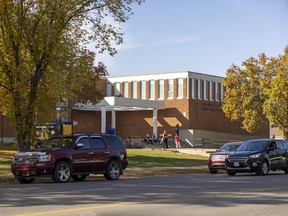Article content
By David Hunt
Ontario’s education system needs real diversity of both secular and religious schools

By David Hunt
Story continues below
With new census data showing a continuing decline in Canadians who identify as religious, a public inquisition appears to be emerging: “Should our education systems stamp out religion?”
The latest questioning comes from Globe columnist Robyn Urback, who casts taxpayer-funded religious schools as “one of the last vestiges of state-sanctioned discrimination.” Calling for the de-funding of Ontario’s Catholic “separate” schools, she claims “the protection of a minority population to educate their children in accordance with the teachings of their church … is no longer relevant or defensible in 2022.”
That’s wrong. Protecting minorities is always relevant. Polling data from Cardus and the Angus Reid Institute finds that Canadians with no religious affiliation have strongly negative attitudes toward many religious groups, especially Christians and Muslims (not that they’re especially warm toward Buddhists, Hindus and Sikhs, either.) If that’s true, maybe the problem is that a less religious society challenges Canada’s tolerant and pluralist character.
Story continues below
That’s especially relevant in schools. Do religious students feel welcome in school? Are they safe to be their authentic selves? Are they comfortable sharing their perspectives? The data suggest the answer increasingly is “no.” Religion is being crowded out of the public conversation, not just the public classroom.
It’s no coincidence that independent school enrolment is up in every province and public school enrolment down. When Cardus studied why parents decide to send their kids to independent schools in Ontario, British Columbia, and Alberta, we found they were primarily looking for a safe and nurturing environment. The overwhelming majority of these parents attended public schools themselves and many had first enrolled their kids at their local district school. Bullying was a common complaint, especially of religious students. And it wasn’t merely peer-to-peer issues. Sometimes, school staff were the bullies.
Story continues below
Meanwhile, the curriculum in many provinces is either silent on religion or presents it as an artifact of a bygone era. Rather than a neutral secularism that presents diverse viewpoints about religion, the norm increasingly is a hostile secularism that assumes “public” means religion-free. This only increases the distance and misunderstanding between Canadians. That matters for at least two critical reasons.
First, new research by Dr. Catherine Pakaluk at the Catholic University of America finds that matching students and schools by religion improves their academic performance. In other words, a good fit and the sense of belonging that it encourages improves standardized test scores in math and reading in and of itself. Ontario’s education system should take note, given students’ poor math performance.
Story continues below



Why would we not want to expand such benefits to as many Canadians as possible? All students should feel welcome and safe at school but we can’t expect every local school to be a good fit for everyone. Which means Ontario’s education system needs real diversity of both secular and religious schools.
Second, we all want good neighbours. That’s why our tax dollars help fund the education of our neighbours’ kids. Intuitively, we all know that education plays a key role in helping children become good citizens. But what happens when we have competing visions of what makes a citizen “good”?
Story continues below
According to the 2021 census, fewer than 35 per cent of Canadians are non-religious. Insisting all schools conform to their educational vision is hardly a recipe for social harmony. So, how can we design our education systems to navigate deep differences? The tried-and-true solution is pluralism. As Dr. Ashley Berner of Johns Hopkins University reports, the overwhelming majority of successful democracies do not view education as the exclusive domain of a secular state. Rather, the state, individuals and civil society play equally important roles in educating the next generation.
Democracy assumes diverse perspectives. Educating for a strong democracy requires no less. Which is why most of the world’s democratic education systems offer public funding to a wide variety of school types — including religious schools, because they, too, form citizens for the common good.
Rather than revoking Catholics’ constitutional rights, let’s expand religious-school funding to all faith communities in Canada. But let’s not stop there. Let’s also continue to protect the rights of Canada’s boldest minority group — secularists. Rather than stamp out competing perspectives, let pluralism bloom.
David Hunt is education director at think-tank Cardus.
Story continues below